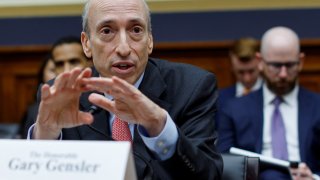
- On Oct. 7, California Gov. Gavin Newsom signed into law a bill that will require large businesses with more than $1 billion in annual revenue that operate in California to disclose their Scope 1, 2 and 3 greenhouse gas emissions to an emissions reporting entity.
- More than two dozen California Democratic lawmakers sent a letter to Gary Gensler, chair of the U.S. Securities and Exchange Commission, pressing him to follow the precedent California has recently established.
- "The passage of SB 253 virtually eliminates the cost of compliance with a federal Scope 3 disclosure requirement for all businesses operating in California with over $1 billion in revenue," the letter from California lawmakers says.
More than two dozen California Democratic lawmakers sent a letter to Gary Gensler, chair of the U.S. Securities and Exchange Commission, pressing him to follow the precedent California recently established in requiring companies to disclose detailed greenhouse gas emissions data.
On Oct. 7, California Gov. Gavin Newsom signed into law a bill that will require businesses with more than $1 billion in annual revenue that operate in California to provide detailed disclosure of their greenhouse gas emissions.
The law requires large businesses to report their scope 1, 2 and 3 emissions. Scope 1 emissions are those generated by fuel sources that a business owns, such as boilers, furnaces and vehicles. Scope 2 emissions are greenhouse gasses emitted to generate the electricity, steam, heat or cooling a business purchases. Scope 3 emissions are generated indirectly from the supply chain and are almost always the largest pool of emissions for any business, as well as the hardest to track.
Get a weekly recap of the latest San Francisco Bay Area housing news. Sign up for NBC Bay Area’s Housing Deconstructed newsletter.
In March 2022, the SEC proposed instituting a set of climate disclosure regulations that would require businesses to report their greenhouse gas emissions and "information about climate-related risks that are reasonably likely to have a material impact on their business, results of operations, or financial condition."
The SEC has received many comments from parties opposed to inclusion of Scope 3 emissions in the forthcoming regulation, including Exxon Mobil, Walmart and agricultural organizations ranging from the National Cattlemen's Beef Association to the National Cotton Council to the Wisconsin Pork Association, all of which request, at the minimum, a Scope 3 exclusion for the agricultural industry.
But the California lawmakers "strongly urge" the SEC "to follow California's lead and specifically include Scope 3 disclosure requirements in addition to Scope 1 and 2," they said in a letter dated Thursday.
Money Report
"Without consistent and reliable Scope 3 data, investors will be limited in evaluating the management's performance with respect to those risks and opportunities," the letter says.
Also, the California lawmakers say that because California has passed SB 253 requiring large businesses in the state to report their Scope 3 emissions, the cost for California businesses to submit the same data to federal regulators is negligible.
A spokesperson for the SEC told CNBC that Gensler would respond to Congress directly regarding the agency's intentions and added that the SEC "benefits from robust engagement and will review all comments submitted during the open comment period."
Gensler told the U.S. House of Representatives Committee on Financial Services on Sept. 27 that it usually takes the SEC between 12 and 24 months to update its rulemaking, but also indicated that the SEC would not be rushed to a final adoption.
"We're focused on getting things right — based upon the economics, the Commission's legal authorities and promoting the SEC's mission — not the clock," Gensler said in testimony.
Don't miss these CNBC PRO stories:
- This bank just hiked its 1-year CD rate to a fresh high
- A low-cost way to protect against an S&P 500 drawdown as risks escalate
- How to invest $1 million for the next decade, according to private bankers and wealth advisors
- This highly profitable industry is booming as the population ages
- Bank of America sees risks for employers as insurance coverage of weight loss drugs grows






